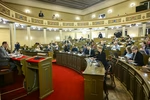
In the first year of the third term of office of the government led by Prime Minister Andrej Plenkovic and his HDZ party, the ruling coalition gained a new partner, the Domovinski pokret (DP), following the parliamentary election on 17 April, and the outgoing year was dominated by the continuation of post-earthquake reconstruction.
The turbulent negotiations to form a new governing majority, which lasted almost a month after the April parliamentary election, resulted in a coalition of HDZ, DP, HSLS (Croatian Social and Liberal Party), HDS (Croatian Democratic Party), HNS (Croatian People's Party), HSU (Croatian Pensioners' Party) and representatives of some ethnic minorities in parliament.
New ministers
At the insistence of the DP, the representatives of the Serb minority and their SDSS had to be excluded from the government. The new, 16th Croatian cabinet officially took office on 17 May.
As the junior partner in the coalition, the DP was given three ministerial posts in the government, which now comprises 18 ministries.
DP representatives Josip Dabro, Ante Susnjar and Ivan Sipic were appointed Ministers of Agriculture, Economy and Demography respectively.
In mid-November, Vili Beros was dismissed from the post of Minister of Health after he was suspected by the anti-corruption agency of colluding in the procurement of hospital equipment and abusing his office. Irena Hrstic (HDZ) replaced him as minister.
Reconstruction after the earthquake continues, wages have been increased, more investment in defence
The government focussed on further accelerating post-earthquake reconstruction, tax reform, further salary increases, housing policy, demographic renewal and the procurement of military equipment.
According to the latest data from the Ministry of Physical Planning, Construction and State Assets, the reconstruction of 12,747 buildings was completed in the areas affected by the earthquakes in Petrinja and Zagreb in 2020, including 12,058 private houses and buildings with 48,018 residential units and 689 public buildings and infrastructure objects.
There are currently 1,938 construction sites under reconstruction in the areas affected by the earthquakes in Zagreb and Petrinja (1,721 private houses and buildings and 217 public buildings and infrastructure objects). A total of 309 houses have been built, while 283 are still under construction.
National housing policy plan approved
A National housing policy plan has been developed and presented with the aim of creating affordable and sustainable housing with land earmarked for residential use.
In addition, a strategy for the demographic revitalisation of Croatia until 2033 was adopted, which defines two main strategic goals: creating a favourable environment for families and young people and ensuring balanced population mobility. The total cost of implementing the strategy is estimated at 9.6 billion euros.
The law on the management and maintenance of buildings was passed in 2024. Among other things, the legislation will restrict the conversion of flats for commercial purposes. The aim is to restrict short-term lettings and increase the supply of flats for long-term lettings.
In addition, the reform of the salary system in state administration and the public sector was finalised with the introduction of new regulations on job titles and salary calculation coefficients.
32% salary increase for 244,000 civil servants and employees
As a result, the salaries of 244,000 civil servants and employees increased by 32% in April compared to 2023, the number of job titles was reduced by 1,155 and a performance bonus was introduced to incentivise efficient work.
For the first time since 2008, pay coefficients for active military personnel were increased, with the highest increases — around 40% — for those with the lowest coefficients (soldiers and non-commissioned officers). As a result, the gross salary of a soldier is now 1,515 euros (compared to 1,103 euros). The allowance for voluntary military training has also been increased from €700 to €900.
It was also decided to procure eight HIMARS missile launchers with the associated missiles and equipment, which will be delivered by 2028 and are worth USD 290 million. A contract was signed for the purchase of the Bayraktar TB2 unmanned aerial system (six modern, armed drones) worth €67 million (excluding VAT), which will be operational in the Croatian armed forces by the end of September next year.
During the year, the first Rafale multi-role combat aircraft arrived in Croatia, and by the end of April next year, the last (12th) aircraft is expected to complete the Croatian Air Force squadron.
The government in numbers
This year, the government held a total of 87 sessions, 36 of which were held by telephone. There were 1,186 items on the agenda, 74 of which related to harmonisation with EU legislation. The sessions lasted a total of 46 hours.
The Croatian parliament passed 91 laws introduced by the government (35 of which related to harmonisation with EU law).
The Plenkovic cabinet passed a total of 1,716 laws and drafted 158 bills. There were two proposals for the state budget, 118 regulations, 534 decisions, 63 proposals for decisions to other bodies, 398 conclusions and 443 resolutions.
This year, the government reviewed 83 strategic and analytical materials, positions and reports.
It submitted 21 reports to the Parliament, 94 opinions and responded to two interpellations on its work. The government also issued a statement on one proposal for a vote of no confidence and answered 15 questions from MPs. The government submitted three acts to the Constitutional Court and the Administrative Court.
Kakvo je tvoje mišljenje o ovome?
Pridruži se raspravi ili pročitaj komentare



 Srbija
Srbija
 Bosna i Hercegovina
Bosna i Hercegovina
 Slovenija
Slovenija



























































